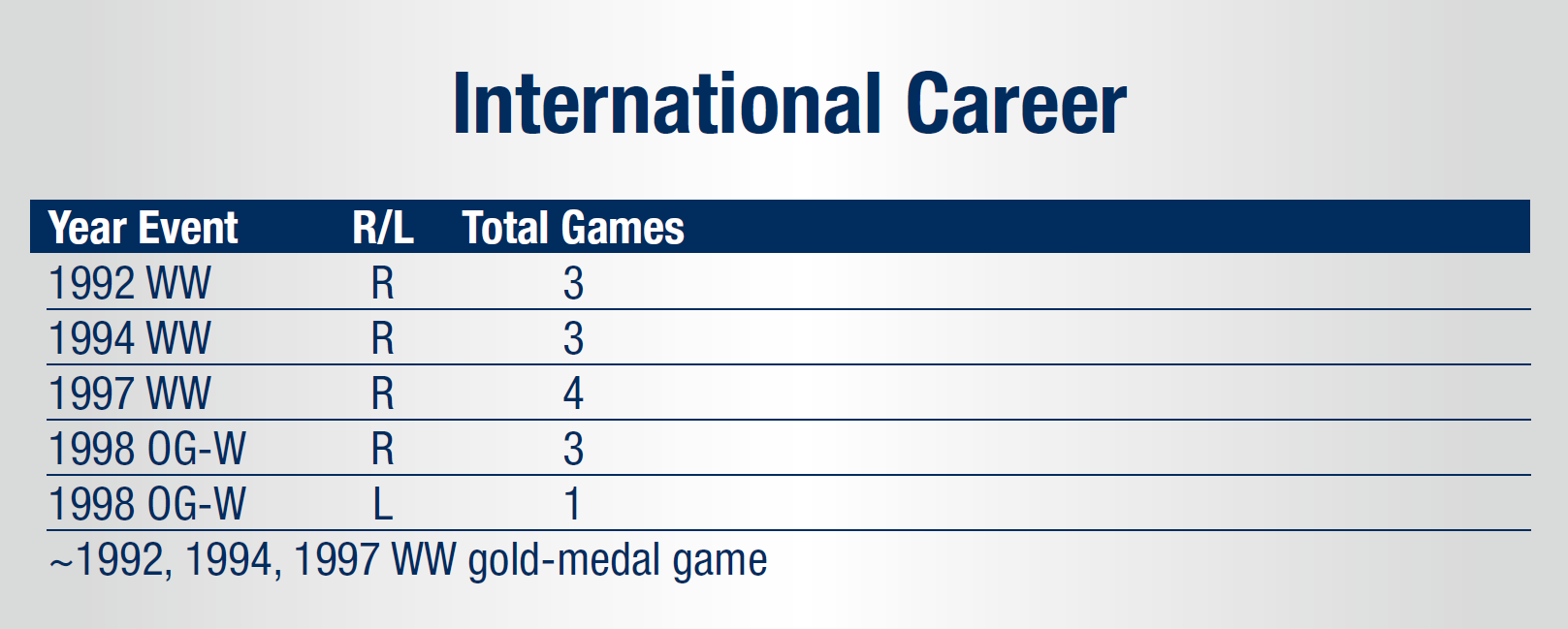Sandra Dombrowski
Official
Born Interlaken, Switzerland, March 19, 1967
In order to appreciate the present, you have to understand the past, and when you appreciate the past, you have to celebrate the pioneers. Sandra Dombrowski was a player at the first, unof- ficial, Women’s World Championship in Toronto, in 1987. She was the first woman to referee men’s games in Switzerland at the amateur level, in the 1980s. She was the first woman to referee the gold-medal game of an IIHF Women’s World Champion- ship (in 1992), the first female member of the IIHF’s Referee Committee (1998) and the first female referee supervisor after she retired as an on-ice official.
And now, she is the first woman inducted into the IIHF Hall of Fame in the Officials’ category.
But even before 1987, Dombrowski was showing what kind of person she was. In 1984, at age 17, she established a women’s team called Bomo, short for Bernese Oberland Modis, situated in Matten, in the Interlaken region of Switzerland. She had played outdoors with the boys throughout her childhood, but girls were not allowed to play on boys’ league teams and there wasn’t a girls’ team in the area. Bomo played against girls’ teams from Fribourg, Lausanne, and Kloten. At first, virtually any girl who could skate would make the Bomo team, but over time, as women’s hockey grew in popularity and participation increased, competition to make the team got more and more fierce.
Dombrowski also earned her referee’s certificate in 1983 and worked her way up through the top men’s amateur league. Born in Switzerland to a Dutch mother and German father, she held only a German passport, so she couldn’t represent Switzerland at the first IIHF Women’s Worlds in 1990. No matter. Her skills as a referee were gaining her greater and greater admiration, and the people who assigned her games made it clear if she wanted to continue to rise, she had to choose between playing and reffing.
Although she is qualified in the field of civil engineering as a draftsperson, Dombrowski took officiating seriously and became a superb skater. Through her years of experience, she understood the multitude of responsibilities the job entailed. Yes, you need to skate well and know the rule book, but you have to know where to look, have a feel for the game, interpret play at a high speed. With few female officials to learn from or consult with, Dombrowski herself set the stage for future generations of women officials with her clear and level-headed knowledge of the game.
Dombrowski was the first woman to referee a Women’s Worlds gold-medal game, in 1992. She subsequently held the whistle at the gold-medal games in 1994 and again in 1997, all games fea- turing the classic Canada-United States rivalry. She also had the
whistle as both a referee and, in an emergency, as a linesperson, at the 1998 Olympics, the first time women competed for a medal.
She retired soon after Nagano and thought her hockey career was over, but Philippe Lacarriere, the Chairperson of the Ref- eree Committee, nominated her to join that group, making her the first woman to assume such an important administrative role at the IIHF. She stayed with the Committee for eight years, and became a referee supervisor, after which she retired from IIHF duties in 2006 while still assuming the role of supervisor for the Swiss Ice Hockey Federation until 2022.

